|
terre thaemlitz writings 執筆 |
|
"I Once Got in Trouble." A Ground-Zero Essay on Bullying c.1985-86, Age 17 - Terre Thaemlitz |
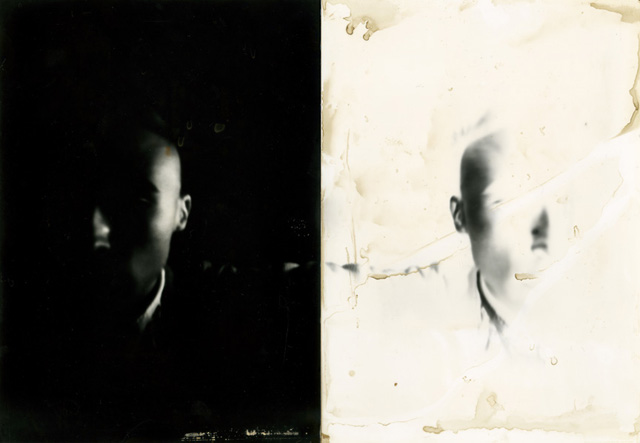
Self-portrait using hand-made pinhole camera, 1985.
Some of you may have read my 1999 comments "On the Columbine High School Massacre." Related to that topic of school violence, I recently came across an odd essay about my own experiences with being "bullied" that I wrote in late 1985 or early 1986, during my last year of high school. I have scanned and posted it below. You will see there is a strong visual component to the essay, which is why I feel the text only makes sense as scanned images. At first I thought of just letting the essay stand on its own, but finding that it has sent me on a journey down memory lane, I would like to set the stage a bit...
 For those who do not already know, I come from a lineage of academic over-achieving nerds. As a child my father was skipped forward a grade, making him too smart and too small for his own good. Although he rarely spoke to me about being harassed by his peers while growing up, I know that at one point during high school he was picked up by fellow classmates and thrown out of a second story window. During my lifetime, I recall one incident when I was perhaps 11 or 12 years old, and had been beaten up by members of the elementary school basketball team that my parents insisted I play on. (This was around the same time professional nerd-poseur and rock icon Rick Nielsen from Cheap Trick called me a "little nerd" in front of my classmates, completely without irony nor satirical reference to his own nerdly image.) My parents considered it vital to my healthy socialization and character development that I be constantly forced to play sports I had no talent for nor interest in. After being chased around the court by several teammates, which was not uncommon, the team captain managed to pin me down face-up on a hardwood stage at the front of the gymnasium. Squatting above my head while standing on my arms, he began repeatedly smashing his ass violently into my face, slamming the back of my head onto the hardwood floor over and over again, until my thick glasses eventually shattered. I have a vague memory of everyone counting off each of his ass-blows to my head, as though they were sit-ups or some other exercise. The coach - a college student who was probably getting course credit for his work that day - was right there laughing along with the rest of the team from start to finish. After "practice" was over (what scenario were my teammates really practicing for?), the coach drove me and the other teammates home as usual. The mood in the car was festive for everyone other than myself, as the coach commented on what a "good sport" I was. When I got home my father discovered my broken glasses - the worst sin I could ever commit as a child. Forget that I had been beaten up. He decided to go and speak with the parents of the team captain, as well as the coach. I had no desire to see those people again so soon, but was dragged along as some kind of evidence. Like a bad American television sit-com, I - the nerd - watched as my father was in turn bullied by both my bully's father and the coach. That was the moment I realized nerdity ran in the family, and the situation was bigger than "just me."
For those who do not already know, I come from a lineage of academic over-achieving nerds. As a child my father was skipped forward a grade, making him too smart and too small for his own good. Although he rarely spoke to me about being harassed by his peers while growing up, I know that at one point during high school he was picked up by fellow classmates and thrown out of a second story window. During my lifetime, I recall one incident when I was perhaps 11 or 12 years old, and had been beaten up by members of the elementary school basketball team that my parents insisted I play on. (This was around the same time professional nerd-poseur and rock icon Rick Nielsen from Cheap Trick called me a "little nerd" in front of my classmates, completely without irony nor satirical reference to his own nerdly image.) My parents considered it vital to my healthy socialization and character development that I be constantly forced to play sports I had no talent for nor interest in. After being chased around the court by several teammates, which was not uncommon, the team captain managed to pin me down face-up on a hardwood stage at the front of the gymnasium. Squatting above my head while standing on my arms, he began repeatedly smashing his ass violently into my face, slamming the back of my head onto the hardwood floor over and over again, until my thick glasses eventually shattered. I have a vague memory of everyone counting off each of his ass-blows to my head, as though they were sit-ups or some other exercise. The coach - a college student who was probably getting course credit for his work that day - was right there laughing along with the rest of the team from start to finish. After "practice" was over (what scenario were my teammates really practicing for?), the coach drove me and the other teammates home as usual. The mood in the car was festive for everyone other than myself, as the coach commented on what a "good sport" I was. When I got home my father discovered my broken glasses - the worst sin I could ever commit as a child. Forget that I had been beaten up. He decided to go and speak with the parents of the team captain, as well as the coach. I had no desire to see those people again so soon, but was dragged along as some kind of evidence. Like a bad American television sit-com, I - the nerd - watched as my father was in turn bullied by both my bully's father and the coach. That was the moment I realized nerdity ran in the family, and the situation was bigger than "just me."
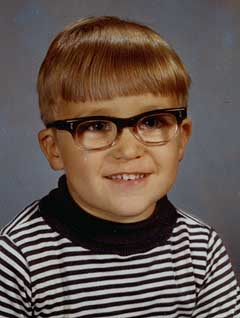
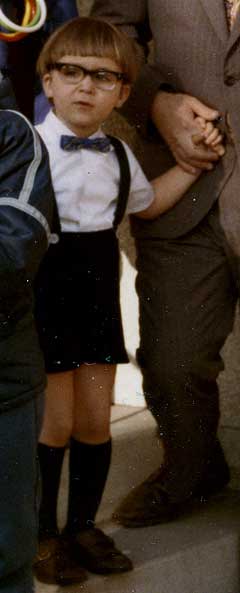 It seems that every decade or so, "bullying" becomes a buzzword in the media. This is true both in Japan and the US. I find the US media's coverage of the issue particularly cheap and manipulative. Every US report and documentary I have seen was padded with countless cliché images of empty classrooms, loner children sitting still amidst a moving crowd of students (often in time-lapse), a hand held camera moving through a school hallway crowded with children looking into the lens, and concluding with some uplifting soundbite about how things are getting better for the children featured in the stories. It is this latter insistance to end on a note of hope that I find particularly cruel. Not because I doubt the sincerity of people wishing for an end to childhood peer violence, but because the representations of that hope are so incredibly formulaic and forced: abused child speaks up and their problems go away. This is the boldest of lies. Although it may make the viewers feel better about themselves - possibly even inspired - it leaves no room for outrage. And finding ways to productively express outrage on this subject is necessary, lest you end up with a situation like Columbine.
It seems that every decade or so, "bullying" becomes a buzzword in the media. This is true both in Japan and the US. I find the US media's coverage of the issue particularly cheap and manipulative. Every US report and documentary I have seen was padded with countless cliché images of empty classrooms, loner children sitting still amidst a moving crowd of students (often in time-lapse), a hand held camera moving through a school hallway crowded with children looking into the lens, and concluding with some uplifting soundbite about how things are getting better for the children featured in the stories. It is this latter insistance to end on a note of hope that I find particularly cruel. Not because I doubt the sincerity of people wishing for an end to childhood peer violence, but because the representations of that hope are so incredibly formulaic and forced: abused child speaks up and their problems go away. This is the boldest of lies. Although it may make the viewers feel better about themselves - possibly even inspired - it leaves no room for outrage. And finding ways to productively express outrage on this subject is necessary, lest you end up with a situation like Columbine.
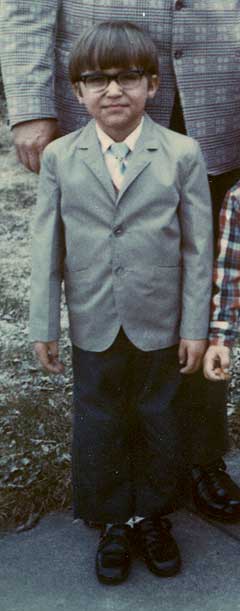
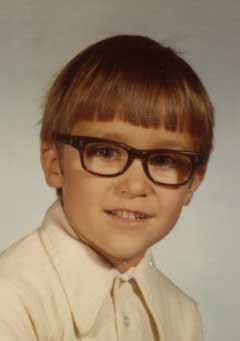 Another problem with the reports and documentaries I have seen is that they focus on the simplistic notion that abused children, if left alone by their bullying peers, will be just fine. This oversimplified approach blocks the more necessary discussion of how to help victims of peer violence manage the effects of their long-term socialization within a bullying environment. Bullying is not only about needing others to leave you alone. It changes you. It changes your world view. It changes how you interact with others. And this is why bullied children, when moved to other schools, still often find themselves targetted as outsiders - we reek of geek. The irony of this situation, as any nerdfreakfag like me is happy to tell you, is that to "re-socialize" bullied children into the dominant social order would involve yet another soul-crushing experience demanding their conformity. After so many years on the outside, such children are not only unlikely to ever be able to "fit in," but would actively resist any such efforts to make them emulate the actions of those they identify as their abusers. This was certainly the case for me, as well as most outsiders I grew up with.
Another problem with the reports and documentaries I have seen is that they focus on the simplistic notion that abused children, if left alone by their bullying peers, will be just fine. This oversimplified approach blocks the more necessary discussion of how to help victims of peer violence manage the effects of their long-term socialization within a bullying environment. Bullying is not only about needing others to leave you alone. It changes you. It changes your world view. It changes how you interact with others. And this is why bullied children, when moved to other schools, still often find themselves targetted as outsiders - we reek of geek. The irony of this situation, as any nerdfreakfag like me is happy to tell you, is that to "re-socialize" bullied children into the dominant social order would involve yet another soul-crushing experience demanding their conformity. After so many years on the outside, such children are not only unlikely to ever be able to "fit in," but would actively resist any such efforts to make them emulate the actions of those they identify as their abusers. This was certainly the case for me, as well as most outsiders I grew up with.
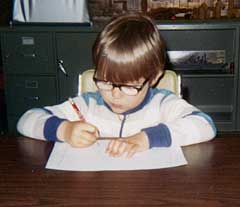
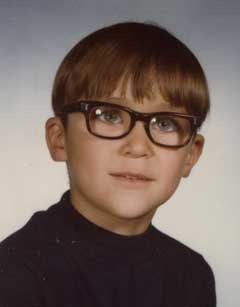 People who knew me as a youth would probably say I became "weird" around age 15, which is when I started altering my appearance in extreme ways to be anything other than what was acceptable in Redneck U.S.A. However, this visual shift was less the beginning of something new in my character, and more of a turning point in my reactions towards those around me. It was the result of a decade of non-stop harassment and de-socialization, my earliest memory of which is being banished to the "girl's table" in the first-grade lunch room. At the time, unaware of any physical difference between boys and girls, I thought I was simply part of that group of students who were not expected to perform well at sports. During my elementary school years, my de-socialization primarily focussed on issues of gender and emasculation. This was actually incredibly simple to do - the key being repetition and daily reinforcement. For example, over the years it had become customary that whenever the class was to be divided into teams for a sports game, the teachers would invariably choose two macho little athletes as team captains with the power to select their preferred teammates. The captains would first fight for the strongest boys, then begin choosing from the toughest of the girls. Eventually, after the last, most frail and quiet girl was reluctantly accepted onto a team solely based on process of elimination, my name would be mumbled like the foulest of curses. Perhaps a part of this post-boy/girl exclusion was my name itself, which in the US was neither the common male spelling, "Terry," nor the usual female spelling, "Terri." I was something other: Terre. Add to that the fact that I was the only student with glasses - thick ones at that - and I clearly inhabited some other realm of gender, as codified by the social mandate, "Never hit girls or boys with glasses." (This mandate, of course, was seldom honored.) I was a liminal being that defied human gender, christened by the other students with the physically descriptive name, "Ten-tits" (an overreaching play on "Thaem-litz"). Those who were so bold as to forego my surname and call me by my given name opted for the equally magical and other-wordly "Terre the Fairy." At pubescence, I graduated from my elementary school's Gender Studies Program to begin my course work in sexuality. A new word - "faggot" - had entered the scene. The next five years of schooling would focus on guiding me through my social de-heterosexualization. Having already completed the Fairy class in elementary school, I qualified for advanced placement in the Honors Fag Program, where I would eventually rise to the top of the class. The concept of faggotry further refined my gender categorization as well. No longer just a walking vaginal "pussy," my entire being was transformed into the more gender-ambiguous orifice of "cock sucker." Throughout both of these immersive educational programs on gender and sexuality, I also came to realize that I held an unusual vantage point for witnessing the construction of the dominant, pro-social genders and sexualities assumed by most of my classmates. A perspective which clearly sprouted the roots of my anti-essentialism. I came to see that nurture, contrary to popular belief, was not engaged in a binary antagonism with nature, but actually defined nature itself. Age 15, then, was the moment when I accepted that my attempts to "fit in" over the previous decade were wasted. To preserve what was left of my sanity, I decided to stop trying to get along with others on their terms. One affect of that decision was no longer being able to passively clothe and represent myself in ways that showed alliance with people and cultural trends I found violent and offensive - alliances I felt (and continue to feel) internalized within myself. Although it may have looked to others like I was trying to express myself, I was more importantly attempting to distance myself from everything and everyone I considered an enemy.
People who knew me as a youth would probably say I became "weird" around age 15, which is when I started altering my appearance in extreme ways to be anything other than what was acceptable in Redneck U.S.A. However, this visual shift was less the beginning of something new in my character, and more of a turning point in my reactions towards those around me. It was the result of a decade of non-stop harassment and de-socialization, my earliest memory of which is being banished to the "girl's table" in the first-grade lunch room. At the time, unaware of any physical difference between boys and girls, I thought I was simply part of that group of students who were not expected to perform well at sports. During my elementary school years, my de-socialization primarily focussed on issues of gender and emasculation. This was actually incredibly simple to do - the key being repetition and daily reinforcement. For example, over the years it had become customary that whenever the class was to be divided into teams for a sports game, the teachers would invariably choose two macho little athletes as team captains with the power to select their preferred teammates. The captains would first fight for the strongest boys, then begin choosing from the toughest of the girls. Eventually, after the last, most frail and quiet girl was reluctantly accepted onto a team solely based on process of elimination, my name would be mumbled like the foulest of curses. Perhaps a part of this post-boy/girl exclusion was my name itself, which in the US was neither the common male spelling, "Terry," nor the usual female spelling, "Terri." I was something other: Terre. Add to that the fact that I was the only student with glasses - thick ones at that - and I clearly inhabited some other realm of gender, as codified by the social mandate, "Never hit girls or boys with glasses." (This mandate, of course, was seldom honored.) I was a liminal being that defied human gender, christened by the other students with the physically descriptive name, "Ten-tits" (an overreaching play on "Thaem-litz"). Those who were so bold as to forego my surname and call me by my given name opted for the equally magical and other-wordly "Terre the Fairy." At pubescence, I graduated from my elementary school's Gender Studies Program to begin my course work in sexuality. A new word - "faggot" - had entered the scene. The next five years of schooling would focus on guiding me through my social de-heterosexualization. Having already completed the Fairy class in elementary school, I qualified for advanced placement in the Honors Fag Program, where I would eventually rise to the top of the class. The concept of faggotry further refined my gender categorization as well. No longer just a walking vaginal "pussy," my entire being was transformed into the more gender-ambiguous orifice of "cock sucker." Throughout both of these immersive educational programs on gender and sexuality, I also came to realize that I held an unusual vantage point for witnessing the construction of the dominant, pro-social genders and sexualities assumed by most of my classmates. A perspective which clearly sprouted the roots of my anti-essentialism. I came to see that nurture, contrary to popular belief, was not engaged in a binary antagonism with nature, but actually defined nature itself. Age 15, then, was the moment when I accepted that my attempts to "fit in" over the previous decade were wasted. To preserve what was left of my sanity, I decided to stop trying to get along with others on their terms. One affect of that decision was no longer being able to passively clothe and represent myself in ways that showed alliance with people and cultural trends I found violent and offensive - alliances I felt (and continue to feel) internalized within myself. Although it may have looked to others like I was trying to express myself, I was more importantly attempting to distance myself from everything and everyone I considered an enemy.

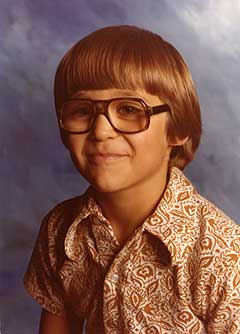 The majority of people grow out of such things. In my case, once I crossed that bridge I was never able to go back. My experiences and sentiments had put me on a path that eventually led to my rejection of Humanist and other essentialist self-representational strategies. While hindsight allows me to honestly say I would not have it any other way (the chief alternatives being either mindless and brutal confirmity, or suicide), I am also clear that I would never wish my "way of life" to become a blanket formula for others to follow. Although the unusual severity of my experiences with bullying (which I consider a form of social training comparable to other forms of schooling) may have left me somehow "qualified" to identify and speak about various forms of social oppression, I would never presume they qualify me to advise others on how to interact en masse. To the contrary, my "qualifications" show me that all actions enact dominations, wittingly or unwittingly. They also testify to an awareness of my own lack of social skills. This is less a statement of my humility, and more a reproach of the arrogance of those who assert visions of hope onto their own analyses of bullying. In their attempts to represent children who are picked-on as self-actualizing individuals simply attempting to be "ourselves," they overlook the impact of anti-socialization which controls so much of what "we" do and feel as victims. Basically, over the years we become something as "unsociable" as our sociopathic bullies, at times crossing that line ourselves. I recall having little patience for the conformist desires of more conservative nerds, in a way that is not so dissimilar from my unwavering hyper-criticality of LGBT and PrideTM movements as an adult. I can imagine this makes me a bully for some.
The majority of people grow out of such things. In my case, once I crossed that bridge I was never able to go back. My experiences and sentiments had put me on a path that eventually led to my rejection of Humanist and other essentialist self-representational strategies. While hindsight allows me to honestly say I would not have it any other way (the chief alternatives being either mindless and brutal confirmity, or suicide), I am also clear that I would never wish my "way of life" to become a blanket formula for others to follow. Although the unusual severity of my experiences with bullying (which I consider a form of social training comparable to other forms of schooling) may have left me somehow "qualified" to identify and speak about various forms of social oppression, I would never presume they qualify me to advise others on how to interact en masse. To the contrary, my "qualifications" show me that all actions enact dominations, wittingly or unwittingly. They also testify to an awareness of my own lack of social skills. This is less a statement of my humility, and more a reproach of the arrogance of those who assert visions of hope onto their own analyses of bullying. In their attempts to represent children who are picked-on as self-actualizing individuals simply attempting to be "ourselves," they overlook the impact of anti-socialization which controls so much of what "we" do and feel as victims. Basically, over the years we become something as "unsociable" as our sociopathic bullies, at times crossing that line ourselves. I recall having little patience for the conformist desires of more conservative nerds, in a way that is not so dissimilar from my unwavering hyper-criticality of LGBT and PrideTM movements as an adult. I can imagine this makes me a bully for some.
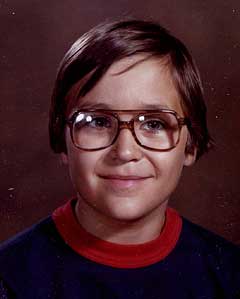
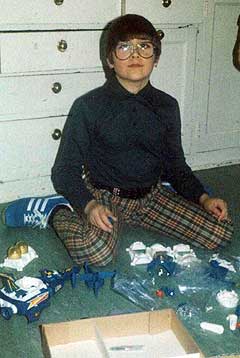 I wrote the following paper at the age of 17, while a senior in high school (grade 12 in the US system). It was my contribution to a district-wide event in which all students in all schools throughout the Springfield R-12 district were required to spend the first hour of school writing a "truthful" essay about what made their school the best. We were told that the purpose of this mandatory essay was to inspire school spirit, which in typical US terms was reducible to arrogant school rivalries and self-superiority complexes. However, the school district also used these papers to evaluate the schools themselves, which I am sure had political and economic ramifications. The teacher of my Advanced English class, Mrs. R. (whom I liked very much), had made it clear to me and the other soon-to-graduate Honor Students that, as the school's "best and brightest," we were expected to deliver some compelling essays as to why good ol' Hillcrest High School was the best in the land. In protest, disgust, outrage, anger, or just plain old psychotic break, I spent the hour scrawling the following six-page rant with my left hand despite being right handed:
I wrote the following paper at the age of 17, while a senior in high school (grade 12 in the US system). It was my contribution to a district-wide event in which all students in all schools throughout the Springfield R-12 district were required to spend the first hour of school writing a "truthful" essay about what made their school the best. We were told that the purpose of this mandatory essay was to inspire school spirit, which in typical US terms was reducible to arrogant school rivalries and self-superiority complexes. However, the school district also used these papers to evaluate the schools themselves, which I am sure had political and economic ramifications. The teacher of my Advanced English class, Mrs. R. (whom I liked very much), had made it clear to me and the other soon-to-graduate Honor Students that, as the school's "best and brightest," we were expected to deliver some compelling essays as to why good ol' Hillcrest High School was the best in the land. In protest, disgust, outrage, anger, or just plain old psychotic break, I spent the hour scrawling the following six-page rant with my left hand despite being right handed:




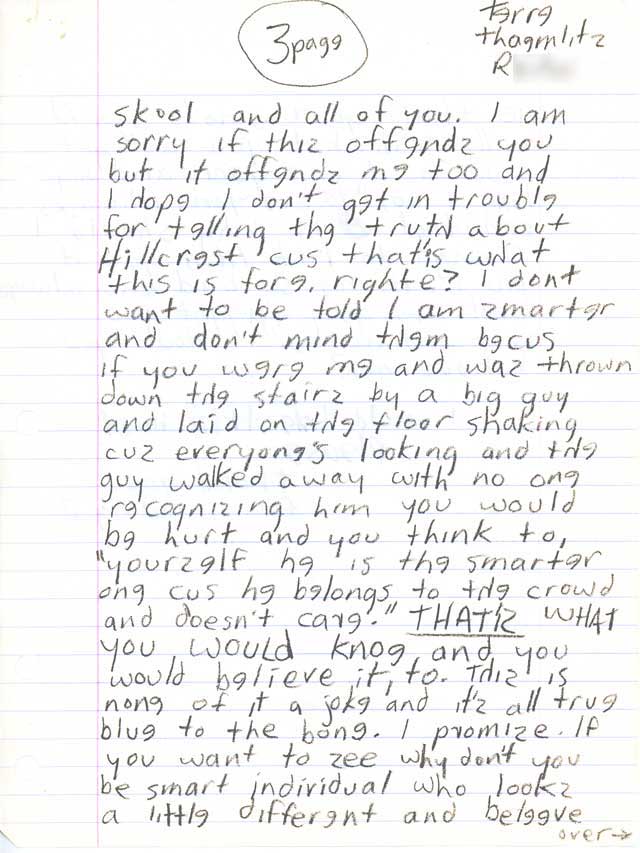

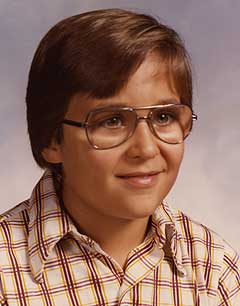 Turning in this essay was a pretty risky thing to do, considering I was a nerd with a grade point average of 4.2 on a scale that theoretically stopped at 4.0 (advanced courses qualified for additional GPA points, allowing me to make up for poor performance in Gym and other things nerds traditionally suck at). But the justified disobedience of DEVO ran deep in my veins. For example, during my tenth grade year the school district began giving out letters for academic excellence to students with high GPA's. These were the same insignia letters traditionally awarded only to jocks for athletic accomplishments, to be stitched onto letterman's jackets or sweaters. As a result of the new policy, I received an academic letter during each of my final three years - one fabric letter, plus two metal bars that were pinned into it for each consecutive award. Of course, jocks were infuriated by the thought of nerds getting lettered like them. As a New Traditionalist Spud, I quickly recognized the "fuck you" potential of my wearing the letter, and set out to make my letterman's sweater. Not your ordinary cardigan, mind you, but an '80s oversized women's V-neck sweater like the girls used to wear over stirrup leggings. I should mention that I also had the habit of wearing my mother's entire collection of rhinestone bracelets and chokers every single day, regardless of what else I was wearing. For the jocks, whenever I wore that sweater I might as well have been wearing a burning American flag.
Turning in this essay was a pretty risky thing to do, considering I was a nerd with a grade point average of 4.2 on a scale that theoretically stopped at 4.0 (advanced courses qualified for additional GPA points, allowing me to make up for poor performance in Gym and other things nerds traditionally suck at). But the justified disobedience of DEVO ran deep in my veins. For example, during my tenth grade year the school district began giving out letters for academic excellence to students with high GPA's. These were the same insignia letters traditionally awarded only to jocks for athletic accomplishments, to be stitched onto letterman's jackets or sweaters. As a result of the new policy, I received an academic letter during each of my final three years - one fabric letter, plus two metal bars that were pinned into it for each consecutive award. Of course, jocks were infuriated by the thought of nerds getting lettered like them. As a New Traditionalist Spud, I quickly recognized the "fuck you" potential of my wearing the letter, and set out to make my letterman's sweater. Not your ordinary cardigan, mind you, but an '80s oversized women's V-neck sweater like the girls used to wear over stirrup leggings. I should mention that I also had the habit of wearing my mother's entire collection of rhinestone bracelets and chokers every single day, regardless of what else I was wearing. For the jocks, whenever I wore that sweater I might as well have been wearing a burning American flag.
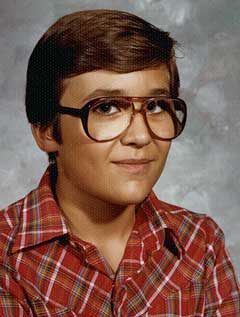 I recall writing the last line of the essay above, "I would like this back please," in a panic just seconds before my teacher took it from my desk. I was terrified of the school administration's reaction to it. One of the school's two Vice Principles - a jock in his youth, and coach of several of the school's sports clubs - had a habit of "rescuing" me from the clutches of jock gangs with sensitive phrases such as, "Alright, alright, we all know Thaemlitz is a jay-bird legged little faggot. You boys run along now..." The school's other Vice Principle had recently threatened to expell me from school due to an incident at a basketball game - a rare moment of my getting into "serious trouble" from which the essay got its title.
I recall writing the last line of the essay above, "I would like this back please," in a panic just seconds before my teacher took it from my desk. I was terrified of the school administration's reaction to it. One of the school's two Vice Principles - a jock in his youth, and coach of several of the school's sports clubs - had a habit of "rescuing" me from the clutches of jock gangs with sensitive phrases such as, "Alright, alright, we all know Thaemlitz is a jay-bird legged little faggot. You boys run along now..." The school's other Vice Principle had recently threatened to expell me from school due to an incident at a basketball game - a rare moment of my getting into "serious trouble" from which the essay got its title.
 A few weeks earlier, during a mandatory pep rally in which the entire student body was herded into the gymnasium and riled into a frenzy against some other school's sports team, I began ironically screaming the chant, "The other guys are dumb!" As far as I was concerned, that about summed up what they were trying to "teach" us... Ironically (or not so), the phrase caught on and the entire stadium started chanting it. The cheerleaders also picked up on it, and began using it as a campy cheer at actual games. After a few games they were informed that their new cheer did not display good sportsmanship, and were ordered to drop it from their repertoire. It seemed they would have to stick to the more traditional and sportsmanlike cheers about massacring, detroying, and burying the enemy.
A few weeks earlier, during a mandatory pep rally in which the entire student body was herded into the gymnasium and riled into a frenzy against some other school's sports team, I began ironically screaming the chant, "The other guys are dumb!" As far as I was concerned, that about summed up what they were trying to "teach" us... Ironically (or not so), the phrase caught on and the entire stadium started chanting it. The cheerleaders also picked up on it, and began using it as a campy cheer at actual games. After a few games they were informed that their new cheer did not display good sportsmanship, and were ordered to drop it from their repertoire. It seemed they would have to stick to the more traditional and sportsmanlike cheers about massacring, detroying, and burying the enemy.
 After hearing my little cheer had been officially banned, which struck me as an unsurprising yet amusing absurdity, I took it upon myself to attend the next scheduled basketball game and start the chant among the crowd myself. Of course, I hated all sports, and was actually terrified of showing up at such an event, but such was my madness... By that time, most students from my school were familiar with the cheer, and several jocks themselves were caught up in "the other guys are dumb fever," so it was an easy flame to ignite. The second Vice Principle immediately identified me as the instigator, and warned me not to do it again.
After hearing my little cheer had been officially banned, which struck me as an unsurprising yet amusing absurdity, I took it upon myself to attend the next scheduled basketball game and start the chant among the crowd myself. Of course, I hated all sports, and was actually terrified of showing up at such an event, but such was my madness... By that time, most students from my school were familiar with the cheer, and several jocks themselves were caught up in "the other guys are dumb fever," so it was an easy flame to ignite. The second Vice Principle immediately identified me as the instigator, and warned me not to do it again.
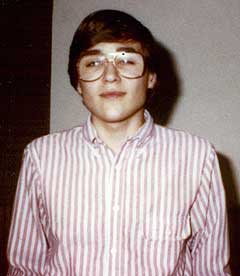 This second Vice Principle was the same ass who stood by during the previous year's pep rally, not two meters from my seat, when an entire section of bleachers began throwing ice from their drinks, empty cups, paper, and anything else they could find at me until I was forced to walk out. Like a scene from a 1980's teen movie, my departure actually triggered a frenzied cheer among the crowd (this incident is referred to on the second and third pages of the essay above). On that day, this same Vice Principle who was so quick to identify me as an instigator had failed to notice anything inappropriate with an entire section of bleechers filled with people shouting and throwing things at me. When I was forced to walk out, he just stood there as I passed directly in front of him, exiting the gymnasium doors, and proceeding out of the school building. I walked to the school parking lot, where I got into my junker 1960 pale blue, four-door Ford Falcon with three-on-the-tree manual transmission, and drove off campus without permission. Destination: deep countryside. It was the only time I ever skipped school. So a year later, when he yelled at me for shouting, "the other guys are dumb," what else could I do but get people to show up at the next game with hand-made T-shirts silently screaming the same? This was Dadaism at its finest. The Vice Principle quickly ejected me from the stadium, and ordered me to appear in his office the next morning for punishment.
This second Vice Principle was the same ass who stood by during the previous year's pep rally, not two meters from my seat, when an entire section of bleachers began throwing ice from their drinks, empty cups, paper, and anything else they could find at me until I was forced to walk out. Like a scene from a 1980's teen movie, my departure actually triggered a frenzied cheer among the crowd (this incident is referred to on the second and third pages of the essay above). On that day, this same Vice Principle who was so quick to identify me as an instigator had failed to notice anything inappropriate with an entire section of bleechers filled with people shouting and throwing things at me. When I was forced to walk out, he just stood there as I passed directly in front of him, exiting the gymnasium doors, and proceeding out of the school building. I walked to the school parking lot, where I got into my junker 1960 pale blue, four-door Ford Falcon with three-on-the-tree manual transmission, and drove off campus without permission. Destination: deep countryside. It was the only time I ever skipped school. So a year later, when he yelled at me for shouting, "the other guys are dumb," what else could I do but get people to show up at the next game with hand-made T-shirts silently screaming the same? This was Dadaism at its finest. The Vice Principle quickly ejected me from the stadium, and ordered me to appear in his office the next morning for punishment.

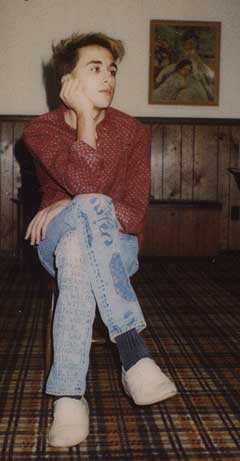 The few times I had previously been in his office were when seeking protection or, heaven forbid, justice for harassment I faced from others. But on this day it was I who was given the scripted talk about how I had disappointed him, how he had expected more of me, etc. He played up the fact that, as an academic achiever, I was supposed to be "smarter" than the other students. Then, taking into consideration the full magnitude of my crime, he declared he would have no choice but to formally expell me from school if I ever chanted "the other guys are dumb" again. I had never heard his speach end with such a threat before. With his words, my ironic little experiment was complete. I had proven the injustice of the school system to myself, as a student who was shoved, spit upon, thrown down stairs, and verbally harassed multiple times per day when walking the hallways between classes. For years I had seen how the students who bashed me faced no punishment or repercussions for their actions - other than the consequence of increased popularity for beating on a fag. Meanwhile, this same school system had swiftly identified me as a problem worthy of expulsion for something as ridiculous as chanting "the other guys are dumb" at a basketball game. On the bright side, I now knew for certain that the injustice and imbalance I had perceived all those years was not simply in my head. It was real. In cases of bullying, this awareness is precious since we are conditioned to believe we brought our troubles upon ourselves. (In fact, I am sure that on some level my asking for the essay back, and subsequently holding on to it over all these decades, was also about a desire for material "proof" of my experiences - a need for souvenirs to remind me that certain events were not simply imagined.) This is but one of the countless subtexts to the at times cryptic essay above.
The few times I had previously been in his office were when seeking protection or, heaven forbid, justice for harassment I faced from others. But on this day it was I who was given the scripted talk about how I had disappointed him, how he had expected more of me, etc. He played up the fact that, as an academic achiever, I was supposed to be "smarter" than the other students. Then, taking into consideration the full magnitude of my crime, he declared he would have no choice but to formally expell me from school if I ever chanted "the other guys are dumb" again. I had never heard his speach end with such a threat before. With his words, my ironic little experiment was complete. I had proven the injustice of the school system to myself, as a student who was shoved, spit upon, thrown down stairs, and verbally harassed multiple times per day when walking the hallways between classes. For years I had seen how the students who bashed me faced no punishment or repercussions for their actions - other than the consequence of increased popularity for beating on a fag. Meanwhile, this same school system had swiftly identified me as a problem worthy of expulsion for something as ridiculous as chanting "the other guys are dumb" at a basketball game. On the bright side, I now knew for certain that the injustice and imbalance I had perceived all those years was not simply in my head. It was real. In cases of bullying, this awareness is precious since we are conditioned to believe we brought our troubles upon ourselves. (In fact, I am sure that on some level my asking for the essay back, and subsequently holding on to it over all these decades, was also about a desire for material "proof" of my experiences - a need for souvenirs to remind me that certain events were not simply imagined.) This is but one of the countless subtexts to the at times cryptic essay above.
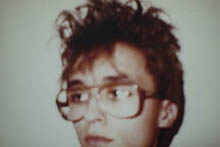 On the day after turning in this essay, I came to school uncertain of what fate awaited me. I expected to be punished. The thought of actually being helped never occurred to me. After my daily English class was over, the teacher asked me to come speak with her. To my surprise, she returned the paper to me, saying in a somewhat embarassed and awkward voice, "I read it. I don't quite know what to say." That was the end of it.
On the day after turning in this essay, I came to school uncertain of what fate awaited me. I expected to be punished. The thought of actually being helped never occurred to me. After my daily English class was over, the teacher asked me to come speak with her. To my surprise, she returned the paper to me, saying in a somewhat embarassed and awkward voice, "I read it. I don't quite know what to say." That was the end of it.
Top 10 Nicknames for Terre in High School
I was guaranteed to be called at least one of the following names when walking the hallway between each and every class - generally multiple times by different people:

- (Fucking/God Damn/Little) Fag (Faggot)
- Hairdo
- (Fucking/God Damn/Little) Queer (Queer-O)
- (Fucking/God Damn/Little) Homo
- (Fucking/God Damn/Little) Freak
- (Fucking/God Damn/Little) Pussy
- (Fucking/God Damn) AIDS Bait
- (Fucking/God Damn) AIDS Bucket
- (Fucking/God Damn/Little) Cock Sucker
- (Fucking/God Damn/Little) Chicken Shit
*Notice that "nerd" and "geek" did not make the top ten. My "fan club," as they came to be known, were a creative bunch. However, make no mistake, "nerd" and "geek" were also heard daily.
Top 10 Non-Verbal Forms of Harassment Encountered by Terre in High School
At least one of the following things was guaranteed to happen each and every day - generally multiple times by different people:
- Being deliberately bumped into.
- Being shoved.
- Being body-checked or body-slammed (eg. into a locker or wall).
- Having my books slapped to the floor and kicked down the hallway.
- Being spit on (often with thick, brown chewing tobacco juice).
- Having food thrown at me (especially triangles of sliced white bread slathered with margarine served to students daily at lunch, which stuck and fell like Wacky Wallwalkers).
- Having wadded paper, erasers, pencils, pens, or other school supplies thrown at me.
- Being punched.
- Being kicked.
- Having beverages poured on my head or splashed onto me.
*More major events like being picked up and thrown down a complete set of concrete steps, car chases, etc., certainly occurred, but were not frequent enough to rank in the top ten. The gunshot incident mentioned on the second page was not school related.
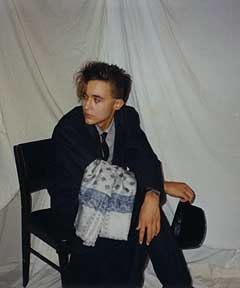 Things were probably the worst for me during my Junior Year (11th grade). Having food thrown at me in the lunchroom was so predictable that it became a part of the daily routines of my friends as well. They would sit and eat with me for a few minutes until the food started flying my way, at which point they would move to a safer table while I remained alone amidst the barrage. It made no sense for me to move, since the flying food moved with me (the safety buffer was about 8 feet from my body in all directions). It also made no sense for others to stick up for me, since doing so would only bring the same misery upon them. We all agreed that it was safer and smarter for them to excuse themselves from my presence.
Things were probably the worst for me during my Junior Year (11th grade). Having food thrown at me in the lunchroom was so predictable that it became a part of the daily routines of my friends as well. They would sit and eat with me for a few minutes until the food started flying my way, at which point they would move to a safer table while I remained alone amidst the barrage. It made no sense for me to move, since the flying food moved with me (the safety buffer was about 8 feet from my body in all directions). It also made no sense for others to stick up for me, since doing so would only bring the same misery upon them. We all agreed that it was safer and smarter for them to excuse themselves from my presence.
 Over the years I had been trained to accept these limited, conditional and contextual friendships. It was commonplace for others to plan after-school activities or parties in front of me, with it being understood that I was not invited because, "well, you know..." After all, I of all people knew what they wished to avoid, and I realized it was only ethical of me to further encourage them to leave my side when things got crazy. I also understood that my visibility as a fag drew fire from other queers who were less visibly identifiable. I came to see my role as a pressure-valve of sorts. In hindsight, I can identify that period of socialization as one reason for my sentimentality and symphathy for "closets." Closets facilitated what few friendships I had. Besides, I had developed an unusual capacity to take the abuse. This was the alchemical result of a contradictory combination of no self-esteem, DEVO-esque arrogance, a belief in non-violent passive resistance (my middle name "Martin" coming from Martin Luther King, Jr.), an emotionally difficult home life that reinforced both my self-loathing and sarcastic assholishness, and my mother's endless mantra, "ignore them and they'll go away." (Voice of Comic Book Guy from The Simpsons: "Worst. Advice. Ever.") On a particularly bad day of food throwing, I might get up and leave the cafeteria before finishing my meal, noisily slamming my entire plastic lunch tray along with ceramic plate and metal silverware into the garbage can rather than returning them to the drop-off area for dirty dishes.
Over the years I had been trained to accept these limited, conditional and contextual friendships. It was commonplace for others to plan after-school activities or parties in front of me, with it being understood that I was not invited because, "well, you know..." After all, I of all people knew what they wished to avoid, and I realized it was only ethical of me to further encourage them to leave my side when things got crazy. I also understood that my visibility as a fag drew fire from other queers who were less visibly identifiable. I came to see my role as a pressure-valve of sorts. In hindsight, I can identify that period of socialization as one reason for my sentimentality and symphathy for "closets." Closets facilitated what few friendships I had. Besides, I had developed an unusual capacity to take the abuse. This was the alchemical result of a contradictory combination of no self-esteem, DEVO-esque arrogance, a belief in non-violent passive resistance (my middle name "Martin" coming from Martin Luther King, Jr.), an emotionally difficult home life that reinforced both my self-loathing and sarcastic assholishness, and my mother's endless mantra, "ignore them and they'll go away." (Voice of Comic Book Guy from The Simpsons: "Worst. Advice. Ever.") On a particularly bad day of food throwing, I might get up and leave the cafeteria before finishing my meal, noisily slamming my entire plastic lunch tray along with ceramic plate and metal silverware into the garbage can rather than returning them to the drop-off area for dirty dishes.
 All of that shit massively fucked me up, and absolutely made me who I am today. The twelve years I spent in school completely twisted my world view in ways that became irreconcilable with others. It not only destroyed my ability to socialize in standard ways, but my desire to socialize in standard ways. While some may attempt to portray that in a good light with phrases such as, "You're better off," such one-dimensional conclusions are unhelpful in addressing the complexly layered problems faced by those who are consistently harassed and bullied. Nor does their optimism acknowledge the active anti-sociality inherent to my current social outlook - attempting to paint over my hard-fought negativity with a lighter shade of black.
All of that shit massively fucked me up, and absolutely made me who I am today. The twelve years I spent in school completely twisted my world view in ways that became irreconcilable with others. It not only destroyed my ability to socialize in standard ways, but my desire to socialize in standard ways. While some may attempt to portray that in a good light with phrases such as, "You're better off," such one-dimensional conclusions are unhelpful in addressing the complexly layered problems faced by those who are consistently harassed and bullied. Nor does their optimism acknowledge the active anti-sociality inherent to my current social outlook - attempting to paint over my hard-fought negativity with a lighter shade of black.

 Personally, I am convinced almost all children experience feelings of being bullied, including the fiercest of bullies themselves. I also believe most youth are so absorbed in one's own miseries that it is impossible to see - let alone police - the cruelties enflicted upon others. At a recent twenty-fifth high school reunion, I was surprised to learn that most people who only knew me from afar believed I was one of the popular kids. Similarly, my art teacher at the time, who continues to be a trusted friend over all these years, swears he had no idea about the fag bashing I faced as a student. Amidst this invisibility, I can only assume the problem of bullying touches everyone at some point or another. However, I am also quite certain that the severity of bullying experienced by some students far outweighs the experiences of others. Based on sharing stories with others over the years, it seems I am one of those people who experienced extreme bullying. One might think that would make me an authority on the subject. However, I have absolutely no profound advice or hope to give people on the subject. In fact, the utter hopelessless I perceive is one of the many reasons I have never wanted to have children of my own. I could never bear the thought of being responsible for cursing this world upon another living being. Of course, a bleak world view such as this is completely censored by the "celebrate life" language of most anti-bully campaigns. I feel no alliance with the language or imagery employed by others on this subject.
Personally, I am convinced almost all children experience feelings of being bullied, including the fiercest of bullies themselves. I also believe most youth are so absorbed in one's own miseries that it is impossible to see - let alone police - the cruelties enflicted upon others. At a recent twenty-fifth high school reunion, I was surprised to learn that most people who only knew me from afar believed I was one of the popular kids. Similarly, my art teacher at the time, who continues to be a trusted friend over all these years, swears he had no idea about the fag bashing I faced as a student. Amidst this invisibility, I can only assume the problem of bullying touches everyone at some point or another. However, I am also quite certain that the severity of bullying experienced by some students far outweighs the experiences of others. Based on sharing stories with others over the years, it seems I am one of those people who experienced extreme bullying. One might think that would make me an authority on the subject. However, I have absolutely no profound advice or hope to give people on the subject. In fact, the utter hopelessless I perceive is one of the many reasons I have never wanted to have children of my own. I could never bear the thought of being responsible for cursing this world upon another living being. Of course, a bleak world view such as this is completely censored by the "celebrate life" language of most anti-bully campaigns. I feel no alliance with the language or imagery employed by others on this subject.
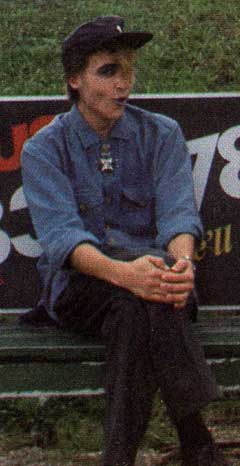 People want to end every discussion of bullying with hope. Let's be realistic. Bullying is destined to remain a part of childhood as long as people continue to consider it a problem to be taken out of the schools, rather than addressed as an inherent manifestaton of the larger cultural dynamics which built those schools. Children emulate the dominations enacted upon them by others, and witnessed in daily life. Dominations and biases that most of the caring parents and school faculty themselves have internalized and become blind and numb to, all the while acting them out. Their prayers and good intentions only betray the simple fact that, on a root level, they just don't get it... In many of the current documentaries, school faculty say they cannot see the bullying unless the bullied kids speak up about what is happening to them... They say they cannot hear the bullying unless the bullied kids say what is happening to them... Even when it is happening right in front of their faces. By trying to make schools a "better place" based on conventional models of human potential and goodness - models born of the parents' and faculties' own social dominations - they unknowingly offer solutions that promote their own numbness. Passing it forward for generations to come.
People want to end every discussion of bullying with hope. Let's be realistic. Bullying is destined to remain a part of childhood as long as people continue to consider it a problem to be taken out of the schools, rather than addressed as an inherent manifestaton of the larger cultural dynamics which built those schools. Children emulate the dominations enacted upon them by others, and witnessed in daily life. Dominations and biases that most of the caring parents and school faculty themselves have internalized and become blind and numb to, all the while acting them out. Their prayers and good intentions only betray the simple fact that, on a root level, they just don't get it... In many of the current documentaries, school faculty say they cannot see the bullying unless the bullied kids speak up about what is happening to them... They say they cannot hear the bullying unless the bullied kids say what is happening to them... Even when it is happening right in front of their faces. By trying to make schools a "better place" based on conventional models of human potential and goodness - models born of the parents' and faculties' own social dominations - they unknowingly offer solutions that promote their own numbness. Passing it forward for generations to come.
I do not know what solutions are possible, if any. Social extraction, such as home schooling, strikes me as the most helpful option. Unfortunately, in those cases children are often led to believe they become victims of a different type of anti-socialization by being extricated from interation with classmates during their "all-important period in life," which most people also (correctly) assure abused children will be completely left behind and inconsequential to their adult lives. So get them out now! Of course, home schooling also immerses children deeper into twisted family dynamics. The families are often led by parents with either no grasp of their own culpability in their child's nerdly evolution, or an agenda to vicariously heal their own childhood wounds through the construction of "normal" children. In my own youth, interaction with adults who had no connections to the worlds of school and family - mentors - played a critical role in my survival. They offered safe houses. They allowed me to sense the existence of social realities beyond family and school, despite my own age and life experiences being limited to those two realms of existence (a possible third being church, which was similarlyl alienating). Yet I recall being constantly pressured by family and school to avoid my independent mentors as suspected perverts - which could not have been further from the truth. This pressure and guilt was particularly fierce if the adult was single, living with a partner out of wedlock, or without children of one's own. "What possible interest could a grown adult have in a child like you?" What possible interest, indeed. The inescapable misdirections of school and family, no matter how well intended, seem destined to sabotage their own attempts to address the problem of peer abuse. My imagination is not great enough to envision a practical response. All I know for certain is that the solution does not rest in helping misfits "fit in." It has more to do with dismantling the "in." And that is an improbability.